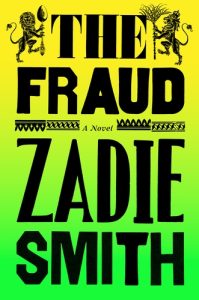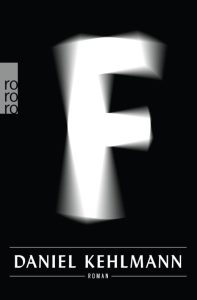Zadie Smith’s latest work of big F fiction is anything but fraudulent but (The) Fraud is writ large on its cover and permeates the narrative – bold faced is the text even when writ small.
To my mind, a veritable romp of a read, but not one to be deconstructed to an allegoric tale of he who was once (and god forbid not future) American president as some – particularly on the other side of the Atlantic – would have it. I mean to say, contemporary comparisons and reflections are always warranted but, loathe as I am to repeat myself, Trump is far less of an aberration than many would have it – rather just the latest in a line of crooks and con-artists – yes, frauds! – who have, and in various incarnations and with various degrees of success, elbowed their way to center stage for times long and short. (Granted, an encore performance there did not have to be!)
The Fraud is Zadie Smith’s first foray into historical fiction, and she does it with aplomb, perhaps not with the absolute Leichtigkeit that she brings when her subjects occupy a space she so totally gets – the northern London suburbs, for example, and characters pulled from that landscape spreading their wings near and far. Here is a writer exploring what is, for her, new (literary) terrain. But I think she succeeds in constructing a 19th century tale that does not feel so distant in time nor in space, rather, has the immediacy of now; certainly, her main protagonist, Eliza Touchet, and those who rotate about her, and whether they be in London or the Home Counties, don’t present as somehow being stuck in a Dickens or Thackeray door-stopper but, instead, read as having the potential to be time-shifters in a Netflix show-stopper. (By the way, these two aforesaid gents I mention not by chance, but because they and others and most especially Eliza’s cousin, William Harrison Ainsworth, are of the cultural and social milieu from which the narrative springs. As a reviewer said, do keep Google at the ready, behind the Fiction are various degrees of Fact. There they are: those F words again!) The success of the novel may also have something to do with style; the post-modern realism in which Zadie Smith writes fits with the uglier, even brutal, side of the burgeoning global world and the intertwined strands leading from Andrew Bogle to the slave plantations of Jamaica and from The (Tichborne) Claimant to the still colony of Australia where England could still banish its unwanted or troublesome and make capital in the process. Suggesting that almost two centuries on, the ghosts of colonialism still haunt the global ambitions of both the once oppressed and the oppressors.
And F can stand for more than (just) Fraud. Recently, I read Daniel Kehlmann’s novel ‘F’ (Rowohlt, 2014), and I see now that, presumably on the back of his previous successes (especially this one) in the international market, it was indeed translated (Vintage, 2015). In any obvious way Kehlmann’s work, set in a contemporary German-speaking space somewhere (if specified, I seem to have missed it), would not necessarily have too much in common with Zadie Smith’s historical novel.
But then there are these damnable F words that call out to me to consider. And it is Fortunate for this comparison some words map quite nicely from German to English, and interconnected F words are prevalent in both languages. The now universality of Fake, for instance; after all just a shade of Fraud (or, is it, Freud?), or the other way around. And Fame and Fortune: Fortune-telling (show me the Future) and changing Family Fortunes for a Father and a Fraternity of three, each with a life defined by Finance and (non-) Fidelity, (not so) Fine Art and Forgery, Food and (feigned) Faith, This, again, is a novel about deception, the power of suggestion and, yes, Fälschung – about Fakery (or something more carnal) being afoot and other forms of Foolery.
And Fate. Towards the end of the novel, the mostly absent Father – he by whom the die was cast, Iacta alea est, and who casts his shadow from the first pages – says:
“Fatum” […].”Das grosse F. Aber der Zufall is mächtig, und plötzlich bekommt man ein Schicksal, das nie für einen bestimmt war. Irgendein Zufallsschicksal […”
“Fate” […] “The big F. But chance is a powerful thing, and suddenly you find yourself living a destiny that was never meant for you. Some random fate […]”
F by Daniel Kehlmann; my own translation
An imperfect book, but an interesting (and often funny) novel in which Kehlmann uses his narrative talents to philosophize on the blurring of lines between that which is true and that which is imagined and that which is just plain false. At the time of publication almost a decade ago, I am not sure that the range of possibilities for bad players to prey upon a digitalized, connected world were fully understood, nor the repercussions; ‘fakery’ mostly remained still in the realm of the classical and obvious forms of deception – human beings telling human lies in very human ways; even a charlatan or trickster of whatever persuasion, peddling whatever their wares is but a sophisticated version of this. Now, a new breed of ‘mover’ – regionally or globally – is sowing seeds of discontent – or just after the next quick buck; harnessing digital technologies to open up new fields of activity beyond the obvious – and anybody can just as easily be the next perpetrator as the next victim.
And F is for Fiction. Two really good works of fiction, from two terrific writers. I think I am correct in saying they are friends.



One thought on “Fakery is afoot”